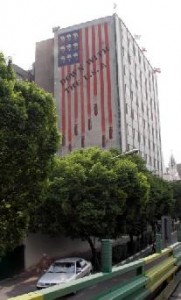Nuclear Weapons Can Be Eliminated: Chapter 10, Part 4
May 16, 2010
Chapter 10: The Middle East, Flash Point of the World
Part 4: Where is the real "threat"?
by Keisuke Yoshihara, Staff Writer
U.S. "double standard" blocks stability and trust in the region
In downtown Tehran, the capital of Iran, is a huge image of the American flag, composed of skulls and bombs, on the wall of a government building. Anti-U.S. sentiment is also seen in graffiti added to a picture of the Statue of Liberty on the wall of the former U.S. embassy building, which was seized by Iranian students in November 1979. The face of Liberty has been deformed into a devil.
At the opening ceremony of the international conference "International Disarmament and Non-proliferation: World Security without Nuclear Weapons of Mass Destruction," held in Tehran on April 17, President Mahmoud Ahmadinejad remarked, "The first nuclear weapons were manufactured and used by the US Administration. This inhuman acts and measures, apparently led to the victory of the US and its allies in the World War the Second but they in fact caused further development of nuclear weapons by other countries and powers."
Against this backdrop, anger exists against the United States for its "double standard" in which the nuclear possession of Israel is condoned while Iran's nuclear program is met with harsh criticism.
In Israel, the government has been distributing gas masks to all residents of the nation since early April. This measure was taken out of concern over Syria, which is alleged to possess chemical weapons. Andy David, deputy spokesman of the Foreign Ministry of Israel, stressed, "Over 60 years after the founding of the state of Israel, a third of the U.N. membership still has not recognized the right of Israel to exist."
Mr. David added, "It is Iran which finances, trains, supplies arms, and supports such organizations as Hezbollah and Hamas." His criticism of Iran referred to the existence of Hezbollah, a Shia Islamist paramilitary organization based in Lebanon, and Hamas, an Islamic fundamentalist organization in Palestine.
Seeking to learn how others in the Middle East view the two hostile nations of Israel and Iran, I interviewed people in Egypt.
Abdallah Alashaal, the former assistant minister of Foreign Affairs of Egypt who has declared his candidacy in the presidential election to be held next year, sided with Iran and said from his home in Cairo: "The Jewish people founded their nation on the claim that they had lived on this land 3,000 years ago. Although international law does not condone such an act, Arab nations were forced to accept the situation. Still, Israel said that it wants Palestinian territory as well. Iran believes that Israel is a trap designed by Western nations to destabilize the Middle East and I would agree."
However, Emad Gad, a research fellow at the Al-Ahram Center for Political and Strategic Studies (ACPSS), a newspaper-affiliated think tank in Cairo, saw the problem in terms of the danger posed by Iran. "Israel does not resort to unreasonable actions," he said. "The nation would turn to nuclear weapons only in the event that it felt its very existence as a nation was in peril. Instead of focusing on Israel, I think immediate action should be taken against the nuclear development activities of the current Iranian administration, as we don't know what it would do with such weapons."
The fact that the nuclear issue looms large in the Middle East is no doubt responsible for further destabilizing the region and hindering trust building efforts there, regardless of which side, as conveyed by these two experts, people will take.
(Originally published on April 30, 2010)








